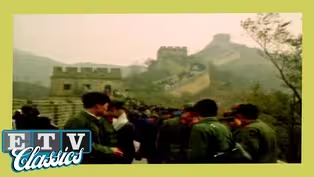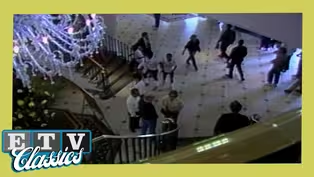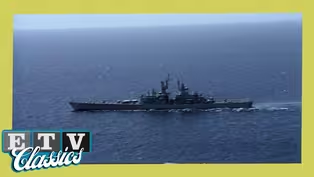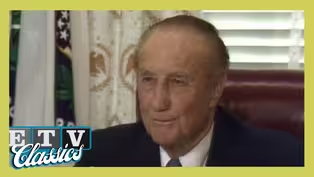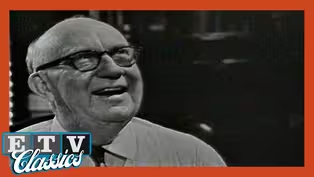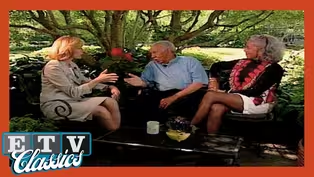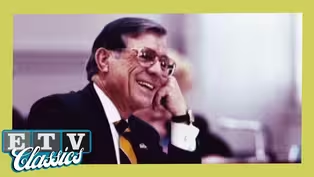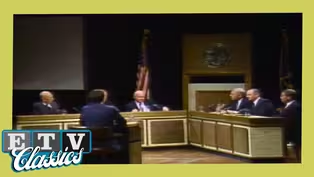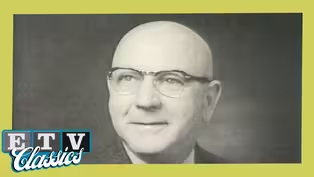ETV Classics
Once a Marine (1980)
Season 15 Episode 16 | 28m 54sVideo has Closed Captions
The memoirs of three businessmen who attribute their successes to their time in the US Marine Corps.
Written by William E. Mahoney and filmed in 1980, this ETV Classic, "Once A Marine", will stir something deep inside you, even if you are not a Marine. The memoir opens with three successful businessmen who talk in turn about what they perceived as the lifelong benefits of having once been a marine, each some twenty years before.
Problems playing video? | Closed Captioning Feedback
Problems playing video? | Closed Captioning Feedback
ETV Classics is a local public television program presented by SCETV
Support for this program is provided by The ETV Endowment of South Carolina.
ETV Classics
Once a Marine (1980)
Season 15 Episode 16 | 28m 54sVideo has Closed Captions
Written by William E. Mahoney and filmed in 1980, this ETV Classic, "Once A Marine", will stir something deep inside you, even if you are not a Marine. The memoir opens with three successful businessmen who talk in turn about what they perceived as the lifelong benefits of having once been a marine, each some twenty years before.
Problems playing video? | Closed Captioning Feedback
How to Watch ETV Classics
ETV Classics is available to stream on pbs.org and the free PBS App, available on iPhone, Apple TV, Android TV, Android smartphones, Amazon Fire TV, Amazon Fire Tablet, Roku, Samsung Smart TV, and Vizio.
Providing Support for PBS.org
Learn Moreabout PBS online sponsorshipMore from This Collection
Find classic news and public affairs programming from South Carolina ETV.
Open Line: Carolina to Shanxi (1980)
Video has Closed Captions
An exchange program for higher education between USC and the people of China's Shanxi Province. (28m 51s)
Charleston Place | Carolina Journal (1986)
Video has Closed Captions
This edition of "Carolina Journal" revisits the opening of the Charleston Place complex. (27m 20s)
U.S.S. South Carolina | Carolina Journal (1984)
Video has Closed Captions
Michael Collins goes aboard the missile cruiser U.S.S. South Carolina as it visits its namesake. (28m 54s)
Strom Thurmond Remembered (2003)
Video has Closed Captions
Charles Bierbauer reviews the life and accomplishments of South Carolina Senator Strom Thurmond. (1h 51m 22s)
Strom Thurmond At The Seat of Power (1982)
Video has Closed Captions
The documentary follows the life and career of Strom Thurmond. (29m 49s)
Profile: The Senator from Barnwell: Edgar A. Brown (1967)
Video has Closed Captions
A visit with the venerable Edgar A. Brown in his law office, home, and the streets of his hometown. (14m 42s)
A Conversation with Justice Ernest Finney, Jr.: A Lifetime of Success (2000)
Video has Closed Captions
The honorable Judge Ernest A. Finney, Jr. discusses his life, career, and legacy in SC's lawfare. (27m 47s)
Profile: Senator John Drummond of Ninety-Six | The Big Picture (2008)
Video has Closed Captions
The life and times of Senator John Drummond of Greenwood, South Carolina. (26m 53s)
The Governors' Roundtable | Carolina Journal (1989)
Video has Closed Captions
A round-table discussion with nine men who served as governor of the state of South Carolina. (57m 54s)
Elie Wiesel | Solomon Tenenbaum Lectureship in Jewish Studies (2006)
Video has Closed Captions
Professor Elie Wiesel, first Nobel laureate delivers a lecture as a part of the Tenenbaum series. (1h 17m 18s)
Solomon Blatt: Speaker Emeritus of the SC House | Carolina Journal (1985)
Video has Closed Captions
The life and career of Solomon Blatt, Speaker Emeritus of the S.C. House of Representatives. (27m 49s)
Remembering Bill Moyers: War in the Gulf - Town Meeting (1991)
Video has Closed Captions
Bill Moyers, who died June 26, 2025, was an award-winning journalist and PBS host. (59m 32s)
Providing Support for PBS.org
Learn Moreabout PBS online sponsorship♪ Robert> I left the Marine Corps 20 years ago.
So it's been a long time.
But as I look back, on that... good experience.
I have a great deal of pride and appreciation for what the Corps did for me.
The Marine Corps has the finest training program of any organization, in my opinion, in the world today.
It's that strong basic training that really provides the source of strength of the Corps.
They give you the finest in leadership training.
Training that stays with you the rest of your life.
And I really believe that it's that foundation that was provided me at that time, that has meant so much to me in my business career.
Strength of the Corps is in its people.
People who, develop a spirit, a great esprit de corps.
Because of the Marine Corps' track record.
and because of the training that they receive.
So, as I look back at it, it's one of the finest experiences that, I could have possibly been given.
And I'm very grateful for it.
Jerry> About 23, 24 years ago, I had the pleasure of entering the Marine Corps.
I had a choice of all the branches, but I chose the Marine Corps because I'd always admired, the type people they produced.
The training at Parris Island was rough.
But I think I learned an awful lot.
I felt good about myself.
It gave me a tremendous amount of confidence to be able to take what I think was the greatest training that could be given to a young man at that time.
Today, looking back over it, I'm proud to have been a Marine.
I consider now, that I'm still a Marine, in heart.
Alfred> The college I attended did not allow fraternities, so I had to wait some time before I joined what I believe is the largest fraternity in the world, the United States Marine Corps.
I can't remember the name of the general who stated that there was no such thing as the next Marine, but former Marines.
Marines who served and who are serving.
They are all members of the Marine family.
And I'm further reminded of a professional baseball team which used as its theme, "one big family" and that's what it means to me, to be part of that Marine family.
William> We began this program with the idea for- I and another former Marine, was because we had noticed an intense feeling that most former Marines had for having once served in the Corps.
So we set out to find out what mystique made them a little brotherhood, how they never forgot all this.
And we're kind of glad to report we weren't able to put our finger on it.
We doubt anybody ever could put their finger on it.
It's a personal reason why they went, why they feel the way they do, still.
And I'm glad we failed.
And the small offering that's about to follow.
Insignificant as it may be, we'd like to dedicate to present Marines, those who were once a Marine, and those above all, who gave their all and are now forever Marines.
(train engine chugging) (train roaring down tracks) (train roaring down tracks) (train brakes squealing) (conductor shouting) (bell ringing) William> I guess this name wouldn't mean much to anyone who wasn't born here.
Except for us, who came from far away.
We'll never forget it.
(bell ringing) (harmonica playing slow tune) ♪ ♪ ♪ ♪ ♪ (boots stomping) Drill Instructor> From now on the first word out of your mouth and the last word out of your mouth will be, sir.
Directly in front of you where is says PBT I want you to put down your last name, you first name and middle initial.
(indiscernible talking) I'm your Senior Drill Instructor.
Is that clear?
Group> Yes sir.
The first word to ever come out of your mouth, from the time you walk out of that building, right there on that door is going to be sir.
Is that clear?
Group> Yes, sir.
Frank> For many thousands, this was the first moment when they truly came to grips with the United States Marine Corps.
The pleasantries of the recruiting office were over.
Drill Instructor> Thank you.
All right, hurry up.
William> I wasn't the only one who had doubts at that moment in Yemassee.
No doubts about joining.
Doubts about measuring up.
It seemed easy for those who had gone before.
Their record was there, already done.
We had to make one.
Drill Instructor> Do nothing until you are told to do it.
Do you understand that?
Group> Yes sir.
(drumming cadence) ♪ Frank> The training, war experience and general matter of being a Marine is common enough.
Soldiers, sailors and airmen have the same usual background.
A great and undeniable difference is far more subtle.
Nobody knows who said it or when.
No matter how many claim it.
But it broke down a mystic feeling into plain language.
Once a Marine, always a Marine.
(drumming continues) ♪ ♪ Well, I thought to myself it isn't Quantico, West Point, or Annapolis.
But it's our Quantico, our West Point, our Annapolis.
There'd be only one bunk and that was enough.
♪ I suppose a lot of us look upon these old buildings now a unique graduate, might see as long little classrooms.
And we did have a fraternity.
We still do.
(drumming continues) ♪ (Drill Instructor giving orders) You understand?
Group> Yes sir.
(indiscernible instructions) William> I would have thought this ground would be at least a hundred feet deeper.
With all those boondockers pounding upon it.
(Drill Instructor shouting) All I could wonder was what this had to do with war.
Discipline didn't seem that necessary.
After all, Hollywood heroes were always disobeying orders and winning medals.
(Drill Instructor rhythmically giving orders) Frank> Discipline is another thing that all branches of the armed forces demand.
So why do the Marines make such a burning issue of it?
William> I don't know how many people were killed doing the right thing.
But I know, a lot more were killed doing the wrong thing.
(soldiers answering commands) I'll never forget that first night sleep was a stranger.
And the war that raged so far away, was even stranger.
It was a waking dream to look about the dimly lighted barracks, and think that these boys, that I, were soon to go to war.
It couldn't be done.
It was impossible.
(bugle playing) ♪ ♪ (light music begins) ♪ ♪ Up in the morning ♪ ♪ Out on the job ♪ ♪ Work like the devil ♪ for my pay ♪ ♪ Frank> There's a friendly, usually, rivalry, between Marines who trained at Parris Island on the East Coast and those at San Diego on the West Coast.
The Parris Island Marine claims he had it worse.
And indeed, in terms of weather, he does.
♪ ♪ Toys for my kids ♪ ♪ sweat 'til I'm ♪ ♪ wrinkled and gray ♪ ♪ While that lucky old son ♪ ♪ got nothing to do ♪ William> It always reminded me of that line in the song that said, "So hot, I almost froze to death.
Shiver and sweat."
If somebody could have predicted the South Pacific war and then Korea, then it was all worthwhile.
Because in reality, you are going to both shiver and sweat.
♪ ♪ Dear Lord above ♪ ♪ can't you know I'm tired ♪ ♪ Tears all in my eyes ♪ ♪ Send down that cloud ♪ ♪ with a silver lining ♪ ♪ Lift me... ♪ Frank> It's been going on like this for a long time.
This is the place where they make it all true.
They've been doing it on a grand scale since World War I, and it all reached its peak in World War II.
When about 200,000 recruits started here on the long, long way to Japan.
Training was swift in those days.
Today it can be extended several weeks.
But as the Japanese continue to fall on everything in the vast Pacific, the hours began to count.
Many a young man who went through here first was also first on Guadalcanal.
♪ ♪ Send on that cloud ♪ ♪ with a silver lining ♪ ♪ and lift me ♪ ♪ to paradise ♪ ♪ Show me that river ♪ ♪ take me across ♪ ♪ Wash all my... ♪ Frank> That old business of hurry up and wait is provided for because there will be boredom.
Even boredom must be provided for because it is an essential part of any war.
For each minute of action, there will be days or weeks of essential boredom.
The mind must be prepared to meet it.
♪ ♪ (Drill Instructor shouting cadence) (soldiers responding in cadence) ♪ Frank> Putting one in front of the other has to be, because he will do it endlessly.
♪ ♪ But there's one thing ♪ I know ♪ ♪ A woman... ♪ a worrisome thing ♪ ♪ to leave you to sing ♪ the blues ♪ ♪ The blues ♪ ♪ A woman will leave you ♪ singing the blues ♪ ♪ I know she will ♪ Frank> The continuing drive to exercise the body to a healthy weariness must be because he will be called upon again and again to work far beyond normal capacity.
All this being the nature of war.
(explosions booming) And it is war we are talking about.
The Marines are taught that their main purpose is to preserve the peace, when there is peace, and to fight with all their might when war shatters that peace.
In a day, when a changing society seems almost to ignore the fact that war remains a possibility, that simple thought is often forgotten, but not by Marines.
♪ ♪ Why does a young man want to be a Marine?
Why the Marines above all else?
♪ ♪ William> I guess everybody had a different reason.
But the common thread ran right through the Corps.
Each felt that being a Marine, was something special.
Most would rather have carried a Marine rifle as a plain private, than to have held an exalted position in some other branch.
Why?
Each had his reason.
But it brought him into the company of those who had, and always will have a bond between them.
The bond of a secret reason, and only one by one can each answer the question, why?
♪ Frank> The Marines are very time conscious.
When you began to be a Marine, how long you were anywhere, and when you arrived anyway, these occupy dear and argumentative places in the Marine heart.
It's often summed up in the phrase, "I have worn out more seabags than you have socks."
Full well knowing, a seabag can last a lifetime.
♪ (explosions booming) William> I guess the best one I ever heard about that was one night under shellfire in Guadalcanal.
We were in a sort of a World War I trench, and Sergeant Connor said, "You know what?
Remember back in Parris Island, the D.I.
used to say, 'Those boys out there on Wake Island, they're Marines.
But you people ain't never going to be Marines.'
Now, he's saying 'those boys out there in Guadalcanal, they're Marines, but you people...'" Frank> It's a striking uniform, alright.
but many a Marine never had one.
William> I looked forward to wearing it.
But the closest I came was pictures of it.
The forest green was all that I and most World War II Marines ever donned.
And there wasn't even much of that.
The green utilities were the thing, and there was greater pride than when they grew ragged in a long campaign.
And the forest green had a real place.
Nobody could say, you joined for a brilliant and beautiful uniform.
We liked the forest green.
♪ ♪ The recruiting posters used to do the obvious.
Portray a jut-jawed huge shouldered marine.
Some fit that poster, but most didn't.
♪ Uncle Sam ♪ ♪ Born on the 4th of July ♪ ♪ I've got ♪ a Yankee Doodle, sweetheart ♪ ♪ She's my Yankee Doodle joy ♪ ♪ Yankee Doodle came to London ♪ just to ride the ponies ♪ ♪ I am that Yankee Doodle Boy!
♪ (indiscernible talking) William> One thing I learned about the Marines, you didn't have to fit a poster.
You did have to have the will to endure.
That's still a must.
I can recall some of the best Marines I ever saw as being very unprepossessing in appearance far from handsome, but they could endure.
That's the major requirement.
♪ Frank> The first Marines of the Revolutionary War are associated with services aboard ships of the Continental Navy.
Even today, the Marine mind slips back to the beginning Picture of war amid the rigging, of musket fire against men who manned the enemy's naval cannon.
♪ William> They said at Parris Island that the best qualified would be selected for service at sea.
Not many would get that service, but all of us could see that picture of life aboard the big ships, of damning the torpedoes and full speed ahead.
♪ Frank> Despite that, one effort of that war for liberty, was the Marine landing in the Bahamas in 1776.
An amphibious landing that was to be repeated so often in World War II and subsequent conflicts.
(jet engine roaring) William> They should have known when the Wright brothers gave it a try at Kitty Hawk, that Marines would want part of that action.
(gun fire sounds) Frank> It was in World War II that the combat Marine flyer came into his own.
Testing the Japanese in the Pacific skies and paving so much of the way for his earthbound comrades in arms in their struggle, far below.
(indiscernible shouting) (indiscernible shouting) William> There was a line from the Marine Corps directive on the ultimate goal of recruit training.
It says, "The overall goal is to produce a basic Marine rifleman who was able to sustain himself on the battlefield."
Drill Instructor> Good, now we get the rest and we do the same thing and we won't have no problems out here, now will we?
Soldiers> No sir.
(indiscernible talking) (Drill Instructor shouting on intercom) (indiscernible talking) William> I think the tie that binds us together is that the biggest idea of all was the basic Marine.
The specialist always knew that he was expected to function as the rifleman whenever it was demanded.
It gave the man grunting along the surface of the earth a good feeling to know that he was the basic Marine, regardless of all the technical developments military science could propose.
(rifles shooting) ♪ Frank> The Marines have a burning sense of history that sustains them.
♪ William> I think Marines are prouder of their history than most military forces being so small, of course.
They could point to so many places Marines have fought, when America was not officially at war.
♪ ♪ ♪ Frank> The Marine Hymn is not just so much lyrical dreaming.
It's words have basis in fact, as hard as the campaigns it obliquely refers to as taking place.
In the snow of far off lands and in sunny tropic scenes.
♪ From the rigging of the ships of John Paul Jones to the American Embassy in Iran, the name "Devil Dog" was earned through the indomitable spirit on the battlefield of France in World War I. Belleau Wood is still a name that haunted World War II Marines, and who struggled desperately to keep up the tradition that demanded constant sacrifice.
(rumbling of explosions) At Bataan and Corregidor, at Wake Island, at Guadalcanal.
(explosions thundering) William> Other than staying alive, there's a half hidden worry that Marines in their first combat have, and that's keeping up the tradition.
There's always the fear of being the first to stain the record.
It might seem a useless fear to some, but it sure helps keep people in line.
Nobody wants to be the one to win that kind of fame.
(bombing sounds continue) ♪ Frank> While Guadalcanal was a long, protracted campaign, Tarawa, was more in keeping with the essential idea of the Marine.
A quick, fierce engagement that sees victory in a matter of days.
♪ ♪ William> I remember we felt sad and proud and a bit hurt of the Tarawa campaign.
After all, we'd not yet hit a hot beach.
As a matter of fact, our next campaign in New Britain was to be something of a Guadalcanal repeat.
Long weary weeks in the jungle.
Our hot beach was still to come.
♪ ♪ Frank> There would be something for everybody.
And while the Pacific War became something of a Marine conflict, those who were there see things in a clearer light.
♪ ♪ ♪ William> I sometimes hated all the malarkey about which branch of service is or was best.
How can any thinking man forget the Navy battling all those odds?
Or the Army which came to fight and die in the same place?
The only difference was we needed tradition and a feeling of being a bit special to sustain our small branch.
No thinking soldier or sailor would want to take that away.
We are willing to face any extra hardship to keep it.
I believe the thinking men of either branches know and respect that feeling.
♪ Frank> The tradition did not suffer in World War I or World War II.
The tradition did not suffer in Korea.
It held in Korea and it held in Vietnam.
♪ ♪ William> I don't really know how to put my finger on it.
That matter of "Why be a Marine?"
I don't know that I would, if I could, I ought to know.
Hell, I was once a Marine.
♪ (upbeat patriotic music) ♪ ♪ ♪ ♪
Support for PBS provided by:
ETV Classics is a local public television program presented by SCETV
Support for this program is provided by The ETV Endowment of South Carolina.
